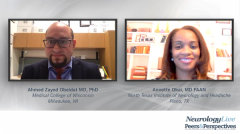
Vaccinations in MS
Two MS experts discuss use and efficacy of vaccinations in patients with MS, especially in patients who are on oral DMTs.
Episodes in this series

Ahmed Zayed Obeidat, MD, PhD: No discussion can go without talking about vaccination these days. We’re still sadly within this pandemic, and hopefully things are improving, but really vaccination consideration in multiple sclerosis is a very important topic. Some of our medications are considered immune suppressive, and some vaccination considerations are important. We receive messages from our patients asking questions via phone calls, and during also the clinical visits we often discuss vaccination consideration not only for COVID-19, but also for many other diseases that we vaccinate for. Vaccination is one of the greatest things in mankind, I think, that prevents diseases and helps us to improve quality of life for people. We’d like to discuss some of these considerations in a brief discussion on vaccination and use of immunosuppressive disease-modifying therapies in multiple sclerosis.
Annette Okai, MD, FAAN: Awesome. That’s a hot topic these days. I was taught first that there are several general mantras or rules that we live by in MS [multiple sclerosis], and one is that we try to avoid live vaccines. We really do not recommend live vaccines to our patients, and so outside of that, when it comes to vaccination, we recommend that most of our patients get vaccinated if there aren’t any other contraindications. Now, let’s talk specifically about immunosuppressive medication and vaccination. As I said before, most of our treatments affect the white blood cells and lymphocyte count, and it lowers that—which is what we want—but speaking specifically to the oral therapies, when we look at the fumarates, teriflunomide, and cladribine, and why those affect the white blood cell count and lymphocyte count, they are not profoundly immunosuppressive when compared to the S1P, for which the blood count is way lower. What does this mean? That’s what my patient will say: “Well, Dr Okai, what does this mean?” Well, regardless of what medication you’re on, we recommend that you get vaccinated. Let’s talk about COVID-19; we recommend that you get the COVID-19 vaccination because it’s a public health issue, and it’s something that is protective for you. Now when it comes to the different forms of medication, and I’ll go through the fumarates, with which there are no issues in response to vaccination, nor with teriflunomide. With cladribine, there are no issues, and this was something that we found was surprisingly good in that there wasn’t an issue when it came to getting the vaccination with this medication that had this unique dosing, because everyone thought, “Well, surely if you’re giving something once a year for 2 years, it’s going to have profound immunosuppression and patients aren’t going to respond.” Studies were done and showed that the response was just as robust regardless of what time you took the medication in relation to when you were taking your pill. With the S1P, that is something that we also looked at, and we saw that while it may not be as robust, patients still needed to take the vaccination because there’s still some response to that, so the overarching message is, if you are on orals, regardless of which one you’re on, take the vaccine. The response is there. You also need a booster because we are affecting your immune system over time, but these medications are designed in a way that people have responded to the vaccine, and they need to be on it. Now, for other vaccines like the flu vaccine, we still recommend that. We now have a non-live shingle vaccine. We recommend it in the appropriate age group. So, as long as it’s not a live vaccine, it’s great, and if you are on the oral therapies, we recommend you get that because you can still mount a response to the vaccination.
Ahmed Zayed Obeidat, MD, PhD: Thank you very much. This is kind of discussing more about the actual antibody response to the vaccination and sometimes in relation to the timing of when the medication, is given. One of the things to emphasize is while we see some immune responses or antibody responses, that does not sometimes equal full protection from the disease. There may still be some infection. Vaccinations are not perfect, and there might still be some T-cell responses that are being studied in some medications, where the antibody response may not be as robust. Overall, I like what you said; take the vaccination if you can as long as it’s not a live vaccine. Vaccinations are important in a global pandemic and in a public health situation. We would recommend people to take vaccines. We took vaccines, right? We want to make sure that our patients are also protected when they come to visit us in the clinic. We also need to be vaccinated. So, there are a lot of these concepts that are great and evolving, and those data that you referred to that were specifically for people living with MS on oral therapies are very important because we know that the majority of the vaccine clinical trials did not include patients with MS, right?
Annette Okai, MD, FAAN: Exactly.
Ahmed Zayed Obeidat, MD, PhD: We really needed this data. When this came, I remember a flood of messages to our clinic, and we really didn’t know what to say. We didn’t know. We needed some data and thankfully now we have enough evidence to see that there are some responses to the vaccine regardless of being on a therapy, with some therapies, as you mentioned, may have a more robust response of antibody mediated response to vaccination.
Transcript Edited for Clarity
Newsletter
Keep your finger on the pulse of neurology—subscribe to NeurologyLive for expert interviews, new data, and breakthrough treatment updates.












